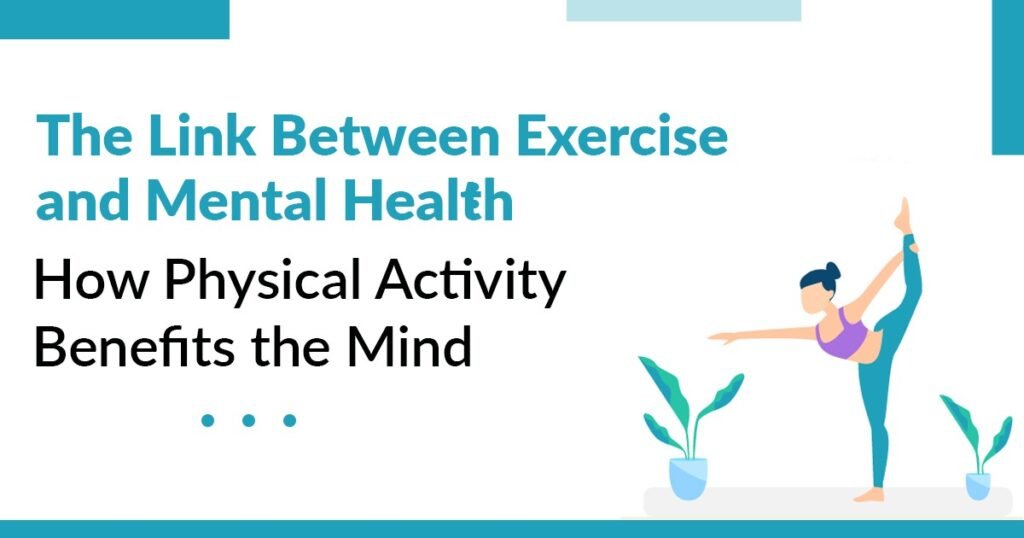The Link Between Exercise and Mental Health: HowPhysical Activity Benefits the Mind
The Link Between Exercise and Mental Health: HowPhysical Activity Benefits the Mind

Did you know that one out of every five individuals in India experiences symptoms of mental illness? Shocking, right? And it is not just a rare occurrence. Half of all mental health conditions start showing up by the age of 20, and a staggering 75% by the age of 30. Mental illness is complex, with various factors playing a role. It is like a dance between your mind, body, and environment, resulting in psychological disorders. Things like chronic stress, biology, substance abuse, and Drug overdose can all play a part.
But here is the silver lining, taking care of your physical and mental health can do wonders. It is not just about avoiding problems, it is about living your best life.
A recent study found that regular exercise is not just good for your body, it is a mood booster too. Researchers analysed data from 1.2 million adults who took part in a survey by the Centers for Disease Control and Prevention (CDC). And guess what they found? Moderate exercise can significantly improve mental health. So, next time you lace up your sneakers, remember, you are doing it for your fitness and mental health . And, if you’re in Patna and need help, there are some best psychiatrists in patna.
Starting to exercise when you are dealing with mental health issues.
Starting to exercise can be tough, especially when you are dealing with mental health issues like depression, anxiety, or stress. It can feel like a double challenge. You know exercise can help you feel better, but depression and anxiety drain your energy and motivation. Plus, social anxiety might make it hard to go to exercise classes or be seen working out in public.
- Start small
- Schedule workouts when your energy is highest
- Focus on activities you enjoy
- Be comfortable
- Reward yourself
- Make exercise a social activity
What are the mental health benefits of exercise?
A study in The Lancet Psychiatry found that, on average, people have about 3.4 bad mental health days each month. But if you exercise regularly, that number drops by more than 40%.
- Exercise is not just about how strong your heart and muscles are or how good you look. Sure, it can trim your waistline and make you healthier, but that is not why most people keep moving.
- People who exercise regularly do it because it makes them feel amazing. They have more energy during the day, sleep better at night, remember things better, and just feel happier and more positive overall.
- Exercise is like a powerful medicine for many mental health issues.
- . Regular exercise can really help with depression, anxiety, and ADHD. It can also lower stress, make your memory better, help you sleep, and make you feel happier overall.. Regular exercise can really help with depression, anxiety, and ADHD. It can also lower stress, make your memory better, help you sleep, and make you feel happier overall.
- You don’t need to be crazy about fitness to get the perks. Even a little exercise can make a big difference. It does not matter how old you are or how fit you feel, exercise can help you cope with mental health issues, boost your energy, and make life better.
- If you are feeling stressed, sad, or anxious, exercise can actually change how your brain works, making you feel less down or worried.
- Exercise is not just about getting fit or looking good it is also about feeling good. People who exercise regularly tend to have more energy, sleep better, remember things better, and feel happier.
- It is Not necessary to overstrain your body to stay fit, even a little exercise helps. Researchers found that doing three to five 45-minute exercise sessions a week is the best for feeling mentally healthy. So, even a short walk or a bike ride can do wonders for your mood!.
Other mental health benefits of exercise
Even if you are not suffering from a mental health problem, regular physical activity can still offer a boost to your mood, outlook, and mental well-being.
Exercise can help provide:
- Sharper memory and thinking
- Higher self-esteem
- Better sleep
- More energy
- Stronger resilience
Exercise is a natural and effective anti-anxiety treatment. It helps to ease stress and tension, boosts both physical and mental energy, and makes you feel better by releasing endorphins. Anything that gets you moving can help, but you will get a bigger benefit if you pay attention instead of zoning out.